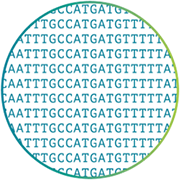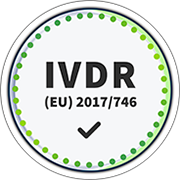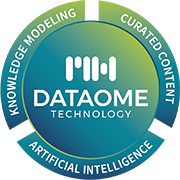Simplify your molecular tumor profiling
The MH Guide1 tertiary analysis solution guides healthcare professionals through the process of analyzing molecular data and supports evidence-based decisions.
Analyze a case with MH Guide – from molecular data to actionable insights:
From molecular data to a concise report in a few steps
Upload sequencing data
- Data upload from secondary analysis platforms (IVD, in-house IVD or LDT)
- Optional: Adaption of data with support of MH VCF Adapter Suite2

Start of IVDR-compliant tertiary analysis with MH Guide


Variant annotation
- Automated variant annotation and detailed biomarker findings
- Expertly curated data from Molecular Health‘s Knowledge Base Dataome
- Annotation data from established databases (ClinVar, dbSNP, gnomAD, ToMMo, and many more)
Automated variant annotation with data derived from Dataome


Interpretation of findings
- ACMG classification
- Oncogenicity classification (ClinGen/CGC/VICC)
- Clinical tiering systems designed in concordance with ESCAT, AMP/ASCO/CAP, and DKTK/NCT guidelines
- Matched therapy associations and region-specific clinical trials
Interpretation including matched therapies and clinical trials



Summary report
- Automated summary report of findings
- Editable summary statement
- Customizable report sections
MH Guide report


JSON/PDF output file
Integrate the right application of MH Guide into your laboratory routine

Frequently asked questions
How do labs and other users access MH Guide software?
MH Guide is a stand-alone Software as a Service (SaaS) application used for in vitro examination of next-generation sequencing (NGS) data or genetic and molecular alteration data to help determine treatment options based on genetic biomarkers and medical guidelines for patients diagnosed with cancer (solid and hematological tumors). MH Guide is designed to be easy to use and intuitive for rapid onboarding. As a hosted SaaS software product, accessible from anywhere through your web browser and equipped with the latest IT security standards, you can quickly start using MH Guide without the burden of purchasing server hardware or other IT resources.
Which file formats are compatible with MH Guide?
MH Guide requires data in Variant Call Format (VCF) from analysis pipelines. MH Guide is NGS panel and secondary analysis pipeline agnostic. MH provides an adaptation tool to generate compatible VCF input from popular secondary analysis products such as Archer Analysis, Illumina Dragen, and Thermo Fisher Ion Reporter. Automatically generated reports can be extended and refined to include results from non-NGS methods (e.g. FISH, IHC, (q)PCR). The software generates well-designed, customizable report templates in PDF and JSON formats.
Which content and databases are available with MH Guide?
Based on data derived from our exclusive, up-to-date, and quality-controlled MH Guide knowledge base, information for interpreting clinically relevant variants is compiled in the context of each patient case and presented to you in standardized Curated Variant Information (CVI) narratives.
The comprehensive presentation of all information in the CVIs dramatically reduces and streamlines the time required to interpret identified variants. The CVIs include details on the identified variants and their unique descriptions, specifying the type of biomarker (predictive, diagnostic, prognostic), source citations, a clinical evaluation of the biomarkers based on internationally accepted actionability tiering systems, and the approval status of the associated treatment options. An undisputed strength of MH Guide is its ability to provide region-specific content matching based on the patient’s location, e.g., drug approvals according to FDA, or EMA, as well as location-based clinical trial matching, including distance calculations to help minimize inconvenience to patients. MH Guide users will also benefit from automated pre-classification of variant pathogenicity and variant oncogenicity according to current recommendations.
All content coming from external databases (public and commercial) is transparently labeled and traceable. Typical external databases used for annotation in MH Guide are various gene and protein models (e.g. Ensemble, RefSeq, UniProt), variant frequency databases (gnomAD, cancerhotspots.org, COSMIC, FLOSSIES, ToMMo), DNA variation databases (ClinVar, dbSNP, BRCA Exchange), selected computational prediction scores such as MaxEntScan, dbNSFP (REVEL, MetaLR, MetaSVM, and many more), and dbscSNV, as well as selected scores for computational prediction of phylogenetic conservation (GERP, PhastCons, PhyloP), and a variety of drug approval and drug information sources, medical ontologies, and practice guidelines.
How frequently is the knowledge base updated?
The knowledge base is updated on a monthly basis to ensure that healthcare professionals have access to up-to-date information.
Is MH Guide secure?
Security and privacy are highly prioritized and embedded throughout the MH Guide system design process. MH uses data centers and hosting providers that are certified to international security standards, including Trusted Site Infrastructure (TSI) and/or ISO 27001. Molecular Health is committed to complying with regional and global security guidelines to ensure seamless implementation of software services for MH Guide customers. In addition, MH Guide complies with data residency and privacy requirements to meet local data privacy and data security requirements. The product also meets all data sovereignty requirements, allowing customers to maintain control over their confidential patient data, which is transmitted using advanced encryption standards (SSL/TLS, AES-256).
Which data privacy measures are available with MH Guide?
MH Guide supports customers operating in regulated environments and complies with current data protection laws, including GDPR (General Data Protection Regulation), HIPAA (Health Insurance Portability and Accountability Act), and the German Genetic Diagnostics Act (GenDG). MH Guide supports full pseudonymization of patient data. Molecular Health processes sensitive data in accordance with applicable regulations and employs industry best practices.
Where is my data stored when using MH Guide?
MH Guide, our advanced NGS tertiary analysis software, is designed to meet the highest standards for data residency, cybersecurity, and health data hosting, both at the national and regional levels.
Your data will be securely processed and hosted in region-specific data centers operated by certified providers. All data centers and hosting providers meet international security standards, such as Trusted Site Infrastructure (TSI) and/or ISO 27001 certification.
Current data centers and hosting providers for MH Guide include:
- Heidelberg iT (Heidelberg, Germany)
- AWS Europe (Paris, France) – Region eu-west-3
- Additional hosting locations are available on request or at product launch
For customers in the United States, MH Guide CAS – our Research Use Only (RUO) version of MH Guide – is hosted on AWS, an ISO 27001-certified provider that complies with modern security and healthcare data requirements: aws.amazon.com/security.
- Both MH Guide CAS and AWS are certified under the Texas Risk and Authorization Management Program (TX-RAMP), ensuring full compliance with Texas state-level cybersecurity and data handling requirements.
For customers in France and Italy MH Guide is hosted on AWS.
- France: HDS-certified (Hébergeur de Données de Santé)
- Italy: ACN-qualified (Agenzia per la Cybersicurezza Nazionale)
Other customers may also use MH Guide hosted on AWS on request.
Where can I find support with LIMS integration, workflow automation, or bioinformatics for MH Guide?
Molecular Health experts have extensive expertise in integrating genomic and genetic analysis tools and data into IT infrastructures.
We offer you:
- Over 10 years of experience integrating MH Guide into various IT environments
- Over 5 years of in-depth experience with IDT/Archer NGS assays and their bioinformatics platform
- Customized genomic data integration and workflow management for NGS, microarrays, cytogenetics, mass spectrometry, and more
- Development and management of automated workflows
- Consulting and assistance with assay validations, and more
- Get in contact with our Customer Success Team
How can I try MH Guide?
Request a free demo here3 with our worldwide partner Integrated DNA Technologies (IDT).
1MH Guide is a stand-alone software as a service (SaaS) used for in vitro examination of next generation sequencing (NGS) data or genetic and molecular alteration data to provide information to aid in the determination of treatment options based on genetic biomarkers and medical guidelines for patients diagnosed with cancer (solid and hematological tumors). MH Guide is used as an expert system for patient management by trained healthcare professionals qualified in genetics and oncology.
2MH VCF Adapter Suite is for research use only. Not for use in diagnostic procedures. Unless otherwise agreed to in writing, Molecular Health GmbH does not intend this product to be used in clinical applications and does not warrant fitness or suitability of the product for any clinical diagnostic use. Purchaser is solely responsible for all decisions regarding the use of the product and any associated regulatory or legal obligations.
3This demo is on an external website with its own data protection policy.

